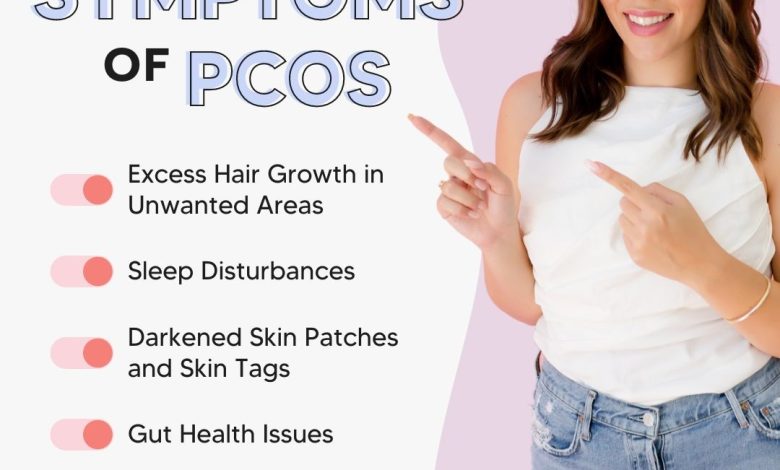💠 7 Unbelievable -PCOS Symptoms Explained Simply: How It Affects Your Body and Fertility

If you’ve ever wondered why your periods are irregular, why you’re breaking out more often than usual, or why losing weight feels nearly impossible — you might be facing PCOS symptoms.
Polycystic Ovary Syndrome (PCOS) is one of the most common hormonal disorders affecting women, especially in their reproductive years. It’s not your fault, and you’re not alone — over 1 in 10 women are affected globally.
Let’s break it all down: what PCOS really is, how to recognize PCOS symptoms, and how it can affect your fertility and everyday life.
🌿 What Is PCOS, Really?
PCOS stands for Polycystic Ovary Syndrome — but don’t let the medical name scare you. It simply means your ovaries aren’t functioning the way they normally should.
Instead of releasing eggs every month (like during ovulation), your ovaries might:
- Fail to ovulate regularly
- Develop small fluid-filled sacs (cysts)
- Produce more androgens (male hormones like testosterone)
These imbalances lead to a chain of symptoms — most of which affect your skin, weight, periods, and fertility.
🔍 Common PCOS Symptoms Every Woman Should Know
Understanding PCOS symptoms early can make all the difference in managing the condition and avoiding long-term complications like infertility or diabetes.
Here are the top signs to watch out for:
1. ❌ Irregular Periods
Missed periods? Or sometimes months with no bleeding at all? This is one of the most common PCOS symptoms — caused by lack of regular ovulation.
2. 💥 Excess Hair Growth (Hirsutism)
You might notice unwanted hair on your chin, chest, or stomach due to high androgen levels.
3. 😓 Acne or Oily Skin
Severe breakouts that don’t respond to normal skincare? PCOS often causes cystic acne, especially around the jawline and cheeks.
4. ⚖️ Weight Gain or Trouble Losing Weight
Even with a healthy diet and exercise, many women with PCOS experience stubborn belly fat and insulin resistance.
5. 💔 Thinning Hair or Hair Loss
Hair might become finer or fall out, especially at the crown — another result of hormone imbalance.
6. 🍩 Insulin Resistance
PCOS is closely linked to your blood sugar. You may notice:
- Cravings for carbs/sweets
- Energy crashes
- Dark skin patches (acanthosis nigricans)
7. 🧠 Mood Swings or Anxiety
Hormonal shifts can affect your emotional wellbeing, often leading to mood disorders.
💔 How PCOS Affects Fertility
One of the most challenging PCOS symptoms for many women is its impact on fertility.
Here’s how it works:
- No ovulation = no egg released.
- Without a regular cycle, getting pregnant becomes harder.
- Even when ovulation happens, the egg quality may be affected.
But — PCOS does not mean you can’t get pregnant. With the right treatment and support, many women with PCOS conceive naturally or with help.
🌟 Pro tip: Knowing your ovulation patterns and tracking your cycle is a powerful first step.
⚖️ What Causes PCOS?
Doctors don’t know the exact cause, but there are some clear contributors:
- Genetics (if your mom or sister has it, you’re more likely to as well)
- Insulin resistance
- Inflammation
- Lifestyle factors like diet and stress
💪 How to Manage PCOS Symptoms Naturally
You don’t have to rely only on medications — many PCOS symptoms improve with lifestyle changes.
🥗 1. Balance Your Blood Sugar
- Eat high-fiber, low-GI foods (like lentils, quinoa, leafy greens)
- Cut back on sugar and refined carbs
- Add healthy fats (avocado, olive oil)
🏃♀️ 2. Move Your Body
Regular exercise (30 mins/day) helps reduce insulin resistance and supports hormone balance. Try:
- Strength training
- Walking
- HIIT
- Yoga (great for cortisol control)
💊 3. Consider Supplements
Some evidence-based options:
- Inositol (especially Myo-Inositol) – supports ovulation
- Magnesium – helps with insulin sensitivity
- Zinc – good for acne
- Vitamin D – many women with PCOS are deficient
🧘♀️ 4. Reduce Stress
Stress increases cortisol, which throws off your hormones even more. Try:
- Journaling
- Guided meditation
- Spending time in nature
- Setting boundaries around work/social media
🧪 When to Get Diagnosed
If you recognize three or more PCOS symptoms, talk to your doctor or a hormone specialist.
Diagnosis is usually based on:
- Medical history
- Blood tests (hormone levels)
- Ultrasound (to check your ovaries)
- Rule out other causes like thyroid or prolactin issues
🛑 What Happens If PCOS Is Left Untreated?
Ignoring PCOS symptoms can lead to:
- Infertility
- Type 2 diabetes
- High cholesterol
- Endometrial cancer (due to irregular periods)
- Mental health challenges
But with early action, many of these risks are fully preventable.
❤️ Final Thoughts: PCOS Is Not the End — It’s a Beginning
You are not broken. You are not alone. PCOS symptoms can feel overwhelming, but they’re also your body’s way of asking for support, attention, and nourishment.
With the right knowledge, tools, and lifestyle, you can take back control of your body and live fully — with or without a diagnosis.
📌 Article Summary (for Yoast & RankMath Optimization)
- Focus Keyword: PCOS symptoms
- Meta Description: Learn what PCOS is, the top 7 PCOS symptoms to watch for, how it affects fertility, and what steps you can take to manage it naturally.
- Slug: /pcos-symptoms-and-fertility-guide
- Internal Link Suggestions:
- Hormone balancing workouts
- Natural supplements for women
- PCOS and mental health
Would you like me to generate a Pinterest pin, social media teaser, or email subject line to promote this article?
